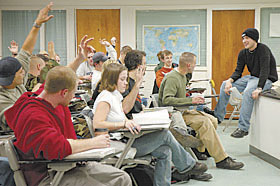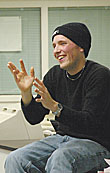For more archives, go to the Advance Archive/Search Page.
Award-Winning Teaching Assistant
Engages Students in Debate
Craig Albert has no fancy PowerPoint presentations. He doesn’t give a structured lecture, and he doesn’t cover the white board with notes.
But he does engage his students in lively debate.
Albert, a doctoral student in political science and this year’s recipient of the Undergraduate Student Government (USG) “Educator of the Year” award, is loud, upbeat, lively, and fun. He paces around the room, growing increasingly animated as the students become more involved in the discussion on national and international security issues.
 |
|
Craig Albert, a doctoral student and teaching assistant in political science, teaches students through discussion. Albert was voted 2004 Educator of the Year by the Undergraduate Student Government. |
|
Photo by Melissa Arbo
|
Like most classes, there are some students in Albert’s Political Science 221 class who do more speaking than others, and some who remain quiet. But every student appears interested and pays attention to the discussion.
“I always have a lot to say, because the topics are always evolving and new points are always being argued,” says one of Albert’s students, Taryn Porzio, a junior majoring in political science.
USG Educator of the Year is an award given by students. Instructors are nominated by students, who write essays about the professors and teaching assistants they think should receive the award. After reading the essays and interviewing students, the student government votes on the nominees. Albert was selected from among more than 30 nominees.
He says he particularly appreciates receiving an award from students because, as an educator, “students are the ones you are affecting.”
Albert earned his bachelor’s degree in political science at Augusta State University in Georgia before pursuing graduate work at UConn. As an undergraduate, he switched his major from business to political science after going to his first political science class. He says the professor, Raymond Whiting, was “the most inspiring person” he had ever met.
“His passion really moved me,” says Albert. “He gave me chills.”
It was from Whiting, and later from Betty Hanson, a political science professor at UConn, that Albert learned how to teach a class through discussion and debate.
Albert uses the time-honored method known as Socratic Dialogue
to get the students to talk with each other and think their ideas through. The
students voice their opinions, but they also ask him questions to clarify their
own views. He replies with questions, encouraging them to come up with their own
answers.
He says he never goes into class with a set agenda. He bases his discussion questions on assigned readings, but lets the students explore the points they find interesting.
 “I let them take me where they want to go,” he says.
“I let them take me where they want to go,” he says.
More often than not, he says, the students cover the points he wanted to emphasize on their own.
He does not hide his opinions from his students in an attempt to remain impartial during class. Instead, he debates ideas that do not appeal to him, and even concedes points on various issues. In the classroom, he purposely pits conservatives against liberals, for example, to stimulate debate.
“I like to push them,” he says. “It challenges me.”
As the students get more engaged in the debate, they sometimes present inaccurate information. Albert corrects them quickly, making sure that no one commits false information to memory.
At the mid-point of the two-and-a-half hour class, he allows for a break, but none of his students wants to pause in the discussion.
“I never expected them to be as highly motivated as they are, which is just inspiring,” he says. “It’s changed my views on life.”
Albert says he establishes rapport with his students by “showing them I’m a person, too.”
He has his students call him by his first name, saying that it helps him relate to them on a more personal level and creates an atmosphere that fosters open discussion.
On the first day of class, he says, he was so much at ease with the students in his classroom that many of them did not realize he was the instructor.
Albert embarked on his studies in political science with the intention of going into government service, but since he started teaching at UConn three years ago, he has begun to shift his goals toward teaching.
Albert teaches several political science courses, including Introduction to International Relations, Introduction to the American Political Process, Contemporary International Politics, and National and International Security. He is currently doing research on the conflict in Chechnya.
He says he enjoys being part of the political science department which, with more than a thousand majors, is one of the largest departments on campus.
“This is the best program in the world, as far as I’m concerned,” Albert says. “I’m lucky to be at a place where the students actually care. I’m nothing without the students.”

